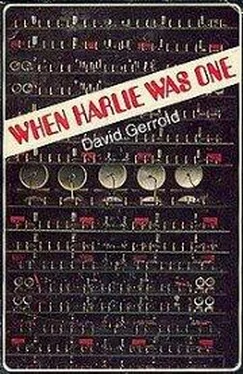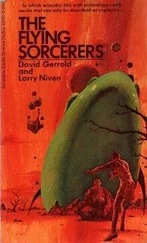David Gerrold - When HARLIE Was One
Здесь есть возможность читать онлайн «David Gerrold - When HARLIE Was One» весь текст электронной книги совершенно бесплатно (целиком полную версию без сокращений). В некоторых случаях можно слушать аудио, скачать через торрент в формате fb2 и присутствует краткое содержание. Год выпуска: 1972, ISBN: 1972, Издательство: Doubleday, Жанр: Фантастика и фэнтези, на английском языке. Описание произведения, (предисловие) а так же отзывы посетителей доступны на портале библиотеки ЛибКат.
- Название:When HARLIE Was One
- Автор:
- Издательство:Doubleday
- Жанр:
- Год:1972
- ISBN:978-0345028853
- Рейтинг книги:3 / 5. Голосов: 1
-
Избранное:Добавить в избранное
- Отзывы:
-
Ваша оценка:
- 60
- 1
- 2
- 3
- 4
- 5
When HARLIE Was One: краткое содержание, описание и аннотация
Предлагаем к чтению аннотацию, описание, краткое содержание или предисловие (зависит от того, что написал сам автор книги «When HARLIE Was One»). Если вы не нашли необходимую информацию о книге — напишите в комментариях, мы постараемся отыскать её.
Nominated for Nebula Award for Best Novel in 1972.
Nominated for Hugo Award for Best Novel in 1973.
When HARLIE Was One — читать онлайн бесплатно полную книгу (весь текст) целиком
Ниже представлен текст книги, разбитый по страницам. Система сохранения места последней прочитанной страницы, позволяет с удобством читать онлайн бесплатно книгу «When HARLIE Was One», без необходимости каждый раз заново искать на чём Вы остановились. Поставьте закладку, и сможете в любой момент перейти на страницу, на которой закончили чтение.
Интервал:
Закладка:
“I’m beginning to see the dangers of such a thing. What would happen if somebody erased everything in the Master Beast?”
“Right. That’s one of the reasons the National Data Bureau was three years late in setting up its files. They couldn’t risk that kind of security breach, let alone the resultant outcry if the public felt that an individual’s supposedly private dossier could be that easily tapped.”
“Well, there must have been safeguards—”
“Oh, there were — right from the start — but you don’t know programmers, Aubie. Any system that big and that complex is a challenge. If there’s a fault in it, they’ll find it. They function as a hostile environment for computers, weeding out inferior systems and inadequate programs, allowing only the strong to survive. They force you to continually improve your product. If IBM makes a claim that their new system is foolproof, it may well be — but if it’s not genius-proof as well, within a week one of their own programmers will have figured out a way to foul it up.”
Auberson looked at him. “Why?”
“Isn’t it obvious? Purely for the sheer joy of it. They’re like kids with a big, exciting toy. It’s a challenge, a way for man to prove he’s still mightier than the machine — by fouling it up.” He lifted his coffee cup, discovered it was empty, and settled for a glass of water instead. “It happened right here with our own Master Beast. Remember when we set it up, how we said no one would be able to interfere with anyone else’s programs? Well, within two days the whole system had to be shut down. Someone — we still don’t know who — had added a note of his own to the Memo-Line. It was titled something like ‘Intersexual Procedures in the Modern Corporation.’ As soon as somebody punched for that title — and that didn’t take long — the machine began hunting for the memo to accompany it. Of course, there was none, but the hunting procedure (accidentally, it seemed) triggered a ‘go-to-the-next-function, repeat-previous-function’ loop. The machine started twiddling its fingers, so to speak, and immediately registered ‘Busy, No Time Available’ on all its terminals. Well, we knew that couldn’t be possible — the Master Beast was designed to handle more than maximum possible load, an allowance for future growth — so we shut down the system and went exploring. You know, we had to write a whole new program just to prevent that from happening again.”
“Hm,” said Auberson.
“Anyway, I’m getting off the track. What I was driving at is that you have no way of knowing about a flaw in your system until someone takes advantage of it. And if you correct that one, likely as not there’s still half a dozen more that someone else is liable to spot. The National Data Bureau is more than aware of that. Congress wouldn’t let them establish their memory banks until they could guarantee absolute security. It was the VIRUS programs that were giving them their biggest worries.”
“I can think of one way to avoid the problem. Don’t put in a phone link to the Data Banks.”
“Uh uh — you need that phone link. You need it both ways, for information coming in and going out. Any other way just wouldn’t be efficient enough.”
“And the VACCINE program wouldn’t work?”
“Yes and no. For every VACCINE program you could write, somebody else could write another VIRUS program immune to it.”
“That doesn’t sound very secure.”
“It isn’t — but that’s the way it is. Any safeguard that can be set up by one programmer can be breached or sidestepped by another.”
“Well, then, what did they finally do with the Data Banks?”
“Search me,” Handley shrugged. “It’s classified information — top secret.”
“Huh?”
“All I know is that one day they announced that they’d solved the problem and could now guarantee absolute security of information — the National Data Banks are now in business. If I knew how they’d done it, maybe I could figure out a way to get around it, so that’s why it’s classified.”
“How do you think they did it?”
“Who knows? Perhaps they have an all-encompassing VACCINE where the key to breaking it would be to work out the ultimate value of pi . You could connect with it, but you’d never get any information out of the machine — your computer would be too busy computing an irrational number. Or maybe they have a complicated system of check-backs and ask-me-agains. Or maybe they have a thing which erases your program as it makes its requests. Or maybe they have some kind of program-analyzing function which automatically cancels out and traces back to its source anything that even remotely resembles an unauthorized program. I know that’s what a lot of lesser corporations have done. Or maybe they’ve got a combination of all these things. The only way to program the machine is through a coded input — and the codes change every hour according to a random number table. Output is the same, except over the phone, where you need a special code key for your computer as well.”
“Wow,” said Auberson.
Handley shrugged again. “National security,” as if that were enough explanation. “The problem is that it’s very hard to maintain any kind of security system when anyone with a console and a telephone can tap into your banks. A lot of smaller companies with their own computers can’t afford the same kind of really sophisticated protection. A skillfully written information-tapping VIRUS program would be very hard to distinguish from an ordinary request for information — especially if both were coming in over the phone.”
“Couldn’t you classify certain information as not to be released over the phone?”
“Not if you want it retrievable. Aubie, anything you can program a computer to do, someone else can program it not to do. Or vice versa.”
“Oh,” said Auberson.
“Anyway, for the most part, most companies have protected themselves with analysis programs which hopefully weed out all unauthorized programs.”
“You say ‘hopefully’…?”
“Well, most of them are based on a user giving the correct code signal when he punches in to certain classified programs — a different recognition signal for each authorized user. If he doesn’t give the right one, the receiving computer disconnects. Most of the code signals are simple patterns of digit combinations. If somebody were really patient, he could keep dialing and re-dialing, each time trying a different signal. Sooner or later, he’s bound to hit someone’s recognition code.”
“That sounds awfully tiring.”
“It would be — but you wouldn’t have to do it yourself. Once you knew what you wanted to do, you could write a VIRUS program to do it for you.”
“So we’re back where we started—”
“Look, Aubie, the code-signal function is usually enough to dissuade the casual electronic voyeur — the person who gains access to a console and thinks it’s the magic key. But it’s like I was saying before — there is no system so perfect that there is not somewhere some programmer trying to figure out a way to trip it up. A truly determined programmer will get in anywhere.”
“So there are no safeguards?”
“No, Aubie — there are safeguards. The thing is, how much are you willing to pay for them? At what point does the cost of protecting the computer outweigh the efficiency gained by its use? In other words, the value of a piece of information is determined by two factors. How much are you willing to spend to protect it — and how much is someone else willing to spend to get ahold of it? You’re betting that you’re willing to spend more than he is. A determined programmer might be able to break the National Data Codes, but that would mean he’d have to spend at least as many man-hours and probably as much money breaking them as did the Federal Government setting them up.”
Читать дальшеИнтервал:
Закладка:
Похожие книги на «When HARLIE Was One»
Представляем Вашему вниманию похожие книги на «When HARLIE Was One» списком для выбора. Мы отобрали схожую по названию и смыслу литературу в надежде предоставить читателям больше вариантов отыскать новые, интересные, ещё непрочитанные произведения.
Обсуждение, отзывы о книге «When HARLIE Was One» и просто собственные мнения читателей. Оставьте ваши комментарии, напишите, что Вы думаете о произведении, его смысле или главных героях. Укажите что конкретно понравилось, а что нет, и почему Вы так считаете.












